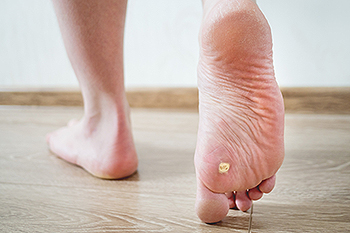

Plantar warts grow inward on the sole of the foot as a result of the weight the feet endure from standing and walking throughout the day. A plantar wart is a specific strain of the human papillomavirus (HPV) and is contagious. It lives and thrives in warm and moist environments, which often include public swimming pools and locker rooms. Patients with a weakened immune system may be more susceptible to getting a plantar wart. This wart appears as a hardened area of the skin on the bottom of the foot and may have small black dots in the center. The warts can cause severe pain and discomfort, and prompt medical attention is often needed for relief. Part of the diagnosis process may consist of cutting away a small area of the wart and sending it to a lab for a biopsy. If you have developed a plantar wart, it is strongly advised that you confer with a podiatrist who can offer you the correct treatment options for relief.
Plantar warts can be very uncomfortable. If you need your feet checked, contact Dr. Alan J. Spector from Shore Podiatry. Our doctor will assist you with all of your foot and ankle needs.
About Plantar Warts
Plantar warts are the result of HPV, or human papillomavirus, getting into open wounds on the feet. They are mostly found on the heels or balls of the feet.
While plantar warts are generally harmless, those experiencing excessive pain or those suffering from diabetes or a compromised immune system require immediate medical care. Plantar warts are easily diagnosed, usually through scraping off a bit of rough skin or by getting a biopsy.
Symptoms
Treatment
To help prevent developing plantar warts, avoid walking barefoot over abrasive surfaces that can cause cuts or wounds for HPV to get into. Avoiding direct contact with other warts, as well as not picking or rubbing existing warts, can help prevent the further spread of plantar warts. However, if you think you have developed plantar warts, speak to your podiatrist. He or she can diagnose the warts on your feet and recommend the appropriate treatment options.
If you have any questions please feel free to contact our office located in Point Pleasant, NJ . We offer the newest diagnostic and treatment technologies for all your foot and ankle needs.